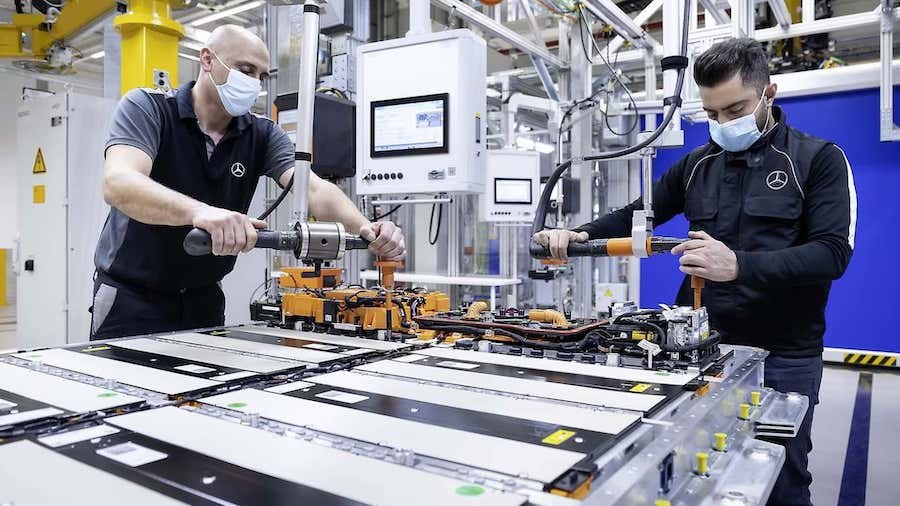Inside Europe's Plan To Hit Back At China With Affordable EVs

It's been called the "toxic cocktail." A mix of high labor costs, shrinking markets across the world, uneven electric vehicle sales and tough new competition from China are working together to bedevil Europe's car companies. Any one of these issues would mean a serious headache for any automaker; together, they make for one of the more apocalyptic environments we've seen for these companies since perhaps the Great Recession.
But Europe's automakers do have a plan to fight back, and that's what we'll cover on today's Critical Materials news roundup. Also on deck: a look at the impact EVs will have on auto jobs, and why U.S. EV and battery investments are hardly slowing down.
I'm a bit ashamed to admit this but as an American, I don't really think about Renault all that much. (Sorry, everyone.) But I've been thinking more and more about the French automaker these days because its newest designs are absolutely fire: the new electric Renault 5, the new Renault 4 E-Tech and others have me wishing this brand would give the U.S. market another go.
Frankly, Renault is going to need all the firepower it can muster. Nearly all the European automakers—the Volkswagen Group, Stellantis, Mercedes-Benz and so on—are losing market share like crazy in China and their home turf at the same time. So at the 2024 Paris Motor Show, which commenced on Monday, those car companies shored up their defenses with new budget EVs.
Other examples include Stellantis' new Chinese joint venture Leapmotor, the Skoda Elroq, some new electric Mini Coopers and so on.
As is the case in America, the overall car market is shrinking because people are fed up with high prices and high interest rates, so more affordable EVs like these are the right move for now. The problem is that China's automakers are making serious inroads into Europe too, and they're hardly just sitting back and letting the home team score some runs (or goals, I guess I should say, since this is Europe we're talking about)
And China still has a tight control over the part of EVs that matters the most: the batteries. Plus, it has the edge on labor costs, though we can't pretend that situation is all sunshine and rainbows.
Do Europe's automakers have a fighting chance here?
What do Donald Trump and Akio Toyoda have in common? At least one thing that I can think of: both are convinced that the move to EVs will have a disastrous impact on employment in the auto sector, which is a crucial part of any country's economy and certainly the global one. Toyoda seems to consider himself not only chairman of the world's largest automaker by volume but also the vanguard of Japan's auto sector and the millions it employs; Trump never passes up an opportunity to spread doom and gloom about EVs on the campaign trail.
It's no secret that EVs need fewer parts than internal combustion vehicles do. So how bad could the jobs impact really be? Right now, research points to "maybe better, actually" or "a bit worse than now." In other words, it depends on who you ask and how they culled their data.
So the jury's kind of out, but I have a very hard time believing this will be some extinction event due to electrification alone; intense competition in this space (see above) is the far greater threat.
I also think that so much of the rhetoric around EVs ignores the jobs that are coming or are in play right now due to investments in this space, including and especially right here in America. To that end...
Maybe some automakers are culling back their EV plans and delaying certain models as sales grow, but not at the level they expected in 2024. I tend to think of this as I do with artificial intelligence: the initial hype wave is over, and now the serious players are settling in for what will be a long war and not some overnight transformation.
But don't think investments in the space are slowing down. Not at all, and especially not in the U.S. Here's one example from Bloomberg again.
Or how today, a Canadian miner announced General Motors will contribute $625 million to a Nevada joint venture for battery-related materials for EVs and hybrids. Or how a Stellantis-backed Silicon Valley startup called Lyten will invest more than $1 billion into "the world's first factory for lithium-sulfur batteries," also in Nevada.
The lists go on and on, and I think it's fascinating that we have three examples like that on one day. But don't think this technology is going anywhere; the alternative is that America lets China continue to take the lead it, and no sane person on the business or policy side in the U.S. wants that.
I can't even remember the last time I saw a Renault on U.S. roads (perhaps this one possibly abandoned one I see in Manhattan from time to time) but in the last couple years, it's quietly upped its design game. As more Americans seek affordable EVs, I wish that new Renault 5 had a path to sales here. But between the battery issues and the tax incentive rules around local production, I'm certainly not holding my breath.
Nouvelles connexes


